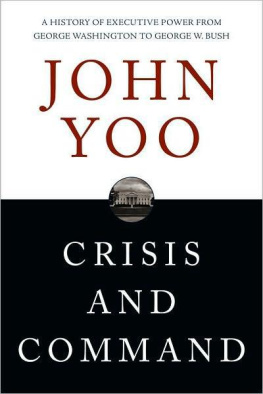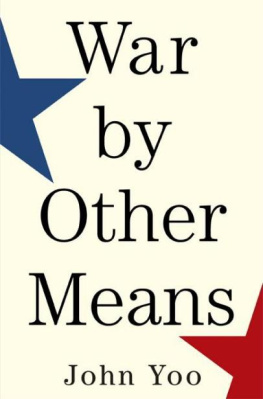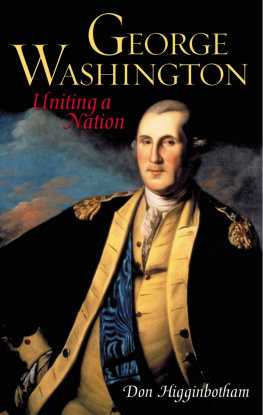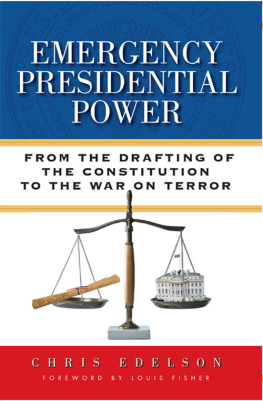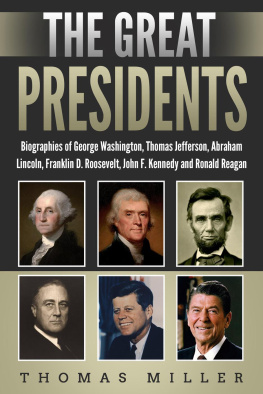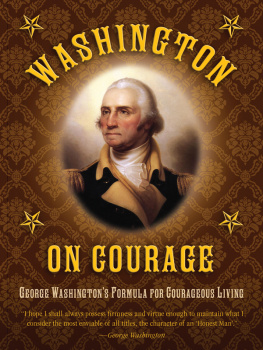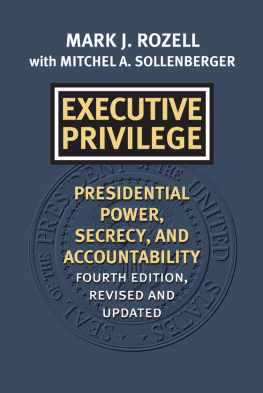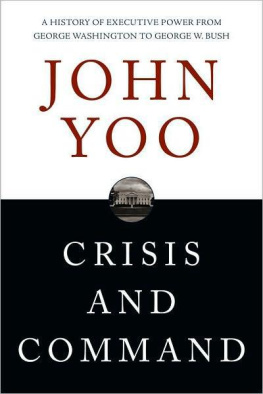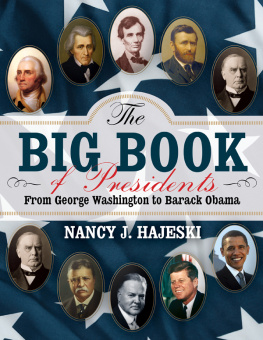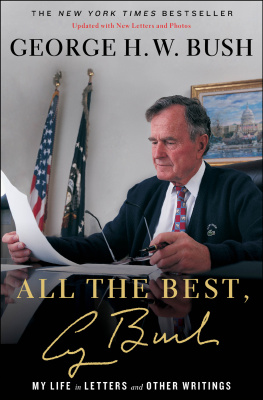CRISIS AND
COMMAND
The History of Executive Power
from George Washington
to George W. Bush

John Yoo

CONTENTS


CRISIS AND COMMAND completes a trilogy on the political, constitutional, and legal controversies provoked by al Qaeda's September 11, 2001, terrorist attacks on New York City and Washington, D.C. War acts on executive power as an accelerant, causing it to burn hotter, brighter, and swifter. It may burn out of control or it may flame out quickly. The American constitutional system has struggled from the birth of the Republic to figure out the right balance between energetic executive power and predictable, normal social activity; and the early years of the twenty-first century have been no different. The unconventional nature of the terrorist threat placed unprecedented stress on the Presidency and its relationship to the other branches of government. Al Qaeda's decentralized form demanded the reinterpretation of the rules of war, including the legitimate grounds for war, surveillance, targeting, detention, interrogation, and trial.
I was an official in the Justice Department involved in developing national security policy in the wake of the September 11 attacks. On the question of waging war, the President's constitutional authority had historically been paramount. Nonetheless, within weeks of the al Qaeda attacks, critics emerged claiming that Congress, rather than the President, should be making policy. In 2005, I wrote The Powers of War and Peace , which explained my view of the original understanding of the Constitution's foreign affairs power, and applied it to post-9/11 questions about starting wars, entering treaties, and setting foreign policy. War by Other Means followed the next year. It explained the logic and legal authority behind the Bush administration's counterterrorism policies, though criticizing its political strategies. Both books argued that the Framers understood the Constitution to give the President the primary direction of national security decisions, with Congress retaining ample authority to check executive policy.
Some disagree with this reading of the original understanding. They object that the Framers' decisions at the end of the eighteenth century should not affect how we make national security policy at the beginning of the twenty-first. They argue that the Framers intended Congress to play the predominant role in setting national security and foreign policy and that legislative action invariably overrides presidential decision-making. Other critics believe that the original understanding of the Constitution has little or no application to contemporary separation-of-power questions. Ideally, they say, Congress should make the major peacetime policy decisions, the President execute them, and the courts adjudicate the cases. Both theories race toward the same finish line. Books with titles like The New Imperial Presidency, The Terror Presidency , or Takeover: The Return of the Imperial Presidency all proceed from the assumption that the President has no significant constitutional authority of his own but is bound to follow Congress's directions, even during war or emergency.
These works, and the contemporary Zeitgeist they reflect, often overlook the importance of events like the Louisiana Purchase, the Emancipation Proclamation, or America's early assistance to Great Britain in World War II. This book explores a factor seldom consulted in debates over executive power today: history. A single volume cannot comprehensively examine the growth of executive power throughout our Constitution's 220 years, but it can deepen our understanding. I trace the genealogy of today's controversies back to the nation's first chief executive, George Washington, then describe how Thomas Jefferson, Andrew Jackson, Abraham Lincoln, and Franklin Roosevelt used the powers of their office in times of crisis. Stephen Skowronek has classified these men as the most transformative Presidents, the ones who disrupted the existing political order and replaced it with one of their own making.
This is not a coincidence. These Presidents are considered great precisely because of their boldness. Some made lasting changes to the political system; others altered the structure and powers of their office. But this alone cannot account for their success. Presidents such as Martin Van Buren, William McKinley, or Woodrow Wilson also wrought noteworthy political changes. Rather, our greatest Presidents became great by leading the nation through crises. "[I]f Lincoln had lived in times of peace," Theodore Roosevelt observed, "no one would have known his name now." There is a significant, but misunderstood, link between the vigorous exertion of executive power and presidential greatness. By themselves, crises don't produce presidential excellence -- just look at James Buchanan, Lincoln's predecessor, or Herbert Hoover, FDR's predecessor. Both responded to emergency -- secession in one case, depression in the other -- by withdrawing feebly into their shells. Chief executives can draw upon a deep well of constitutional authority when they act in the face of peril. Some may respond by bowing to Congress and respecting the status quo, but that course might perpetuate the very policies that failed in the first place. The qualities that define the executive -- energy, speed, decisiveness, and secrecy, among others -- are indispensable in emergency situations. The ordeals of the nation's founding, the Napoleonic Wars, the Civil War, or World War II were not overcome without Presidents of the day making use of the very broadest reach of their constitutional powers.
Some may read this book as a brief for the Bush administration's exercise of executive authority in the war on terrorism. It is not. It is a book about the constitutional and institutional history of the Presidency. It is not meant to be as comprehensive as histories that scour the life and times of a single Chief Executive. Instead, I seek here to provide a different perspective: to describe the relationship between the constitutional authorities of the office, and presidential success as measured by scholars of the Presidency. I examine how individual Presidents understood and used their constitutional authorities to deal with challenges, successfully or not.
This book is also written out of respect for Congress as well as the President. I have had the honor to serve as general counsel of the Senate Judiciary Committee under the chairmanship of Senator Orrin G. Hatch of Utah, a good and decent man as well as a steward of the Senate. I have the greatest respect for the awesome powers of Congress and the ways in which Congress and the broader political system can check any chief executive. It was Congress that forced the resignation of Richard Nixon through hearings, political pressure, spending constraints, and ultimately, the threat of impeachment. Today's critics of the Presidency underestimate the power of politics to corral any branch of government that goes too far. They give too much credit to appeals to abstract notions of constitutional balance to restrain a truly out-of-control President, or misread active responses to unprecedented challenges as challenges to the Constitution. The hyperbole in such rhetoric is manifest in overwrought yet commonplace invocations of "treason" or "tramplings" of the Constitution. Has the Constitution indeed been trampled on? History provides us with a guide.
Next page
